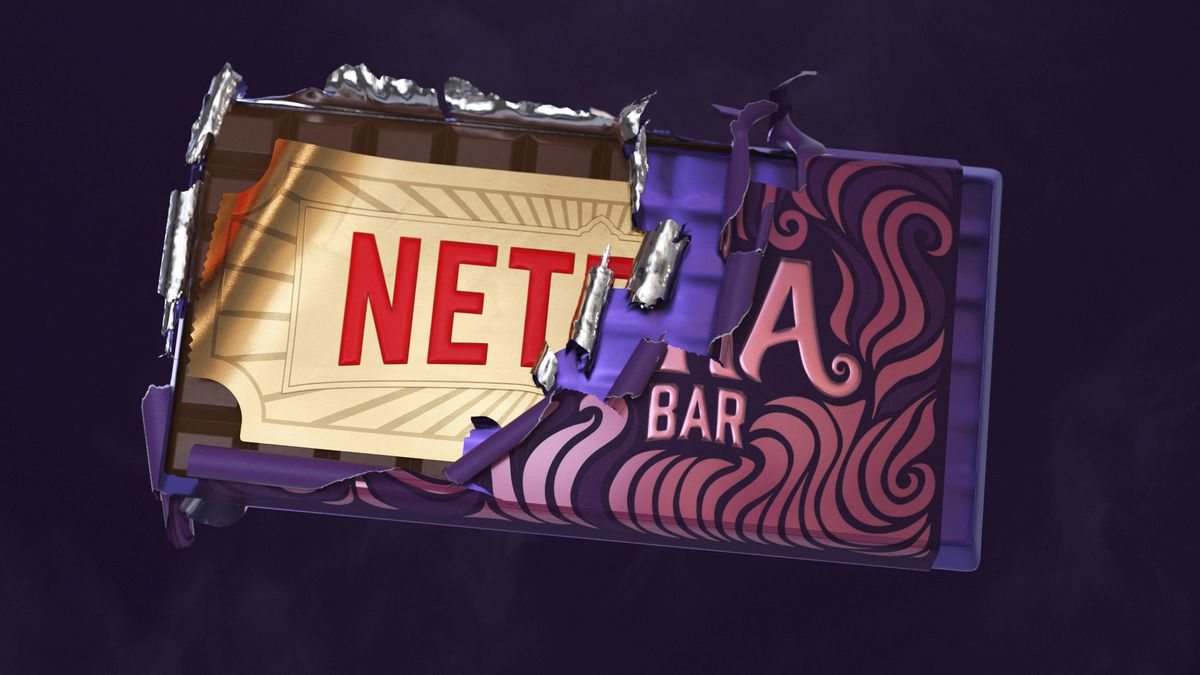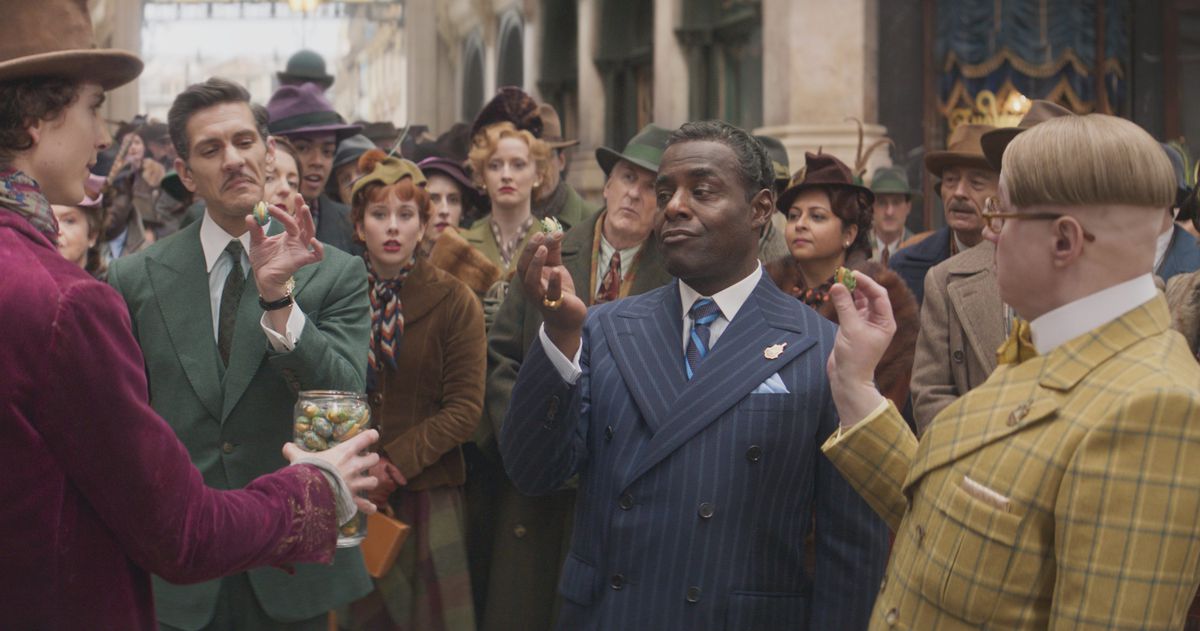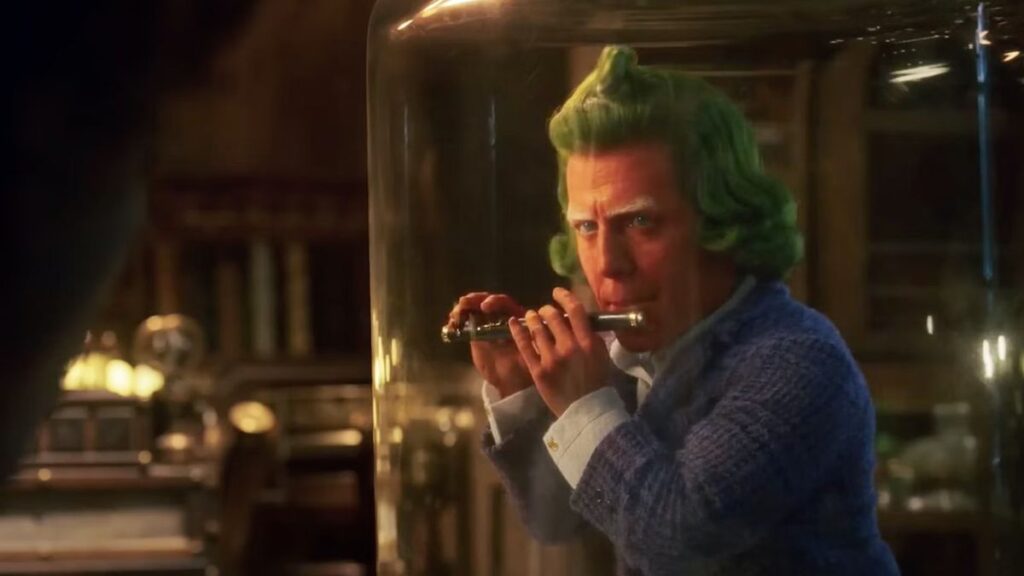Wonka, out in theaters starting Dec. 15, is the latest attempt to expand the story of Roald Dahl’s famed chocolatier. Maybe the origin story of how Willy Wonka started his chocolate factory isn’t a tale anyone was clamoring for, and the casting of Timothée Chalamet makes it sound like more of a star-of-the-moment IP-friendly vehicle than an honest attempt at for-all-ages filmmaking.
But I am here to say: Director Paul King (Paddington, Paddington 2) funneled pure imagination into the assignment. It’s a real movie, full of clever filmmaking and genuine heartwarming moments. Surprise!
After smiling my way through Wonka, relieved that I still had the heart to enjoy a full-bore blast of nicecore entertainment, I did think there were a few things most people would want to know about the film in advance. So if you’re on the fence about seeing Wonka, or just want to walk in with the confidence of a young lad ready to put legacy candymakers out of business, consider the following:
Wonka runs under two hours, but stick around for a post-credits scene
Image: Warner Bros. Pictures
Wonka clocks in with a run time of 113 minutes (before credits), and I am happy to report it never overstays its welcome. (Unless you hate fun, in which case you’ll be bolting for the door when the credits roll.) But if you stick around during the credits, you get a few bonuses.
First, Hugh Grant’s Oompa-Loompa character, Lofty, returns for one more Oompa-Loompa song, inviting viewers to stay in their seats as he explains what happened to each character in the film. It’s a sweet finish for some of the charming but minor supporting players, and a final silly comeuppance for minor villains Mrs. Scrubbit (Olivia Colman) and Bleacher (Tom Davis). And if you’re in it for the long haul, you get one more surround-sound blast of Chalamet singing one of the movie’s earworms, “A World of Your Own.” Which leads me to another key point…
Wonka is a full-blown musical
What compels studios to make movie musicals, but never want to sell them as movie musicals? I personally blame Hugh Jackman’s 2017 film The Greatest Showman, where trailers showed Jackman dancing and Zendaya mouthing the words to songs, but no one actually singing. All the sugary original songs written for the movie were relegated to background tracks. Somewhat insidious! But the movie made $435 million worldwide, so I guess the tactic worked.
Warner Bros. has taken a similar approach in selling Wonka. The trailers leave a vague sense that the movie is musical, but not clearly A Musical. Well, that’s exactly what it is: In the vein of Mary Poppins, The Music Man, and other stage-y 1960s movie musicals, Wonka bursts at the seams with dance and songs, written by Neil Hannon.
British comedy fans know Hannon as the frontman for The Divine Comedy and the composer behind everything from the IT Crowd theme to recent Doctor Who ballads. He’s a perfect fit for throwback tunes belted by Chalamet’s airy tenor voice — “You’ve Never Had Chocolate Like This” and “Scrub Scrub” are personal favorites. Whisked into Joby Talbot’s delicate score, it’s all truly whimsical. If you’re normally averse to musicals, all I can say is: This is one of the good ones.
It’s technically a prequel to the 1971 Wonka movie, not the book
Many die-hard Roald Dahl fans will gripe that Chalamet’s Wonka is a far cry from the Wonka of Dahl’s children’s books Charlie and the Chocolate Factory and Charlie and the Great Glass Elevator. But King and his co-writer, Simon Farnaby, are walking down a particular path with their characterization of Wonka in this film: Not only is he a young version of the character, he’s specifically a young version of Gene Wilder’s Wonka from 1971’s Willy Wonka & the Chocolate Factory.

The rights to Willy Wonka & the Chocolate Factory exist in a tricky gray area. In September 2021, Netflix outright acquired the Roald Dahl estate, with ambitious plans to adapt the author’s stories in a multitude of styles. A few projects have come to fruition: Matilda the Musical debuted in December 2022, Wes Anderson’s collection of Dahl short films hit the platform this past fall, and an animated movie based on The Twits is currently slated for 2025. At the time of the announcement, Netflix also made a major promise: a TV series based on Chocolate Factory, spearheaded by Taika Waititi and Wreck-It Ralph writer Phil Johnston. There have been no updates on the project since the original announcement.
So how can Warner produce a full-blown Wonka musical in 2023? Because the studio was ahead of the curve on Dahl-mania. In 2016, Warner struck a deal with the Dahl estate to license Wonka yet again in order to prequelize its 1971 film (as opposed to, uh, that whole Tim Burton/Johnny Depp thing). Reports suggest that after Netflix swooped in to own Wonka a few years later, the streamer opted to honor all existing relationships and plans, which meant Warner could continue to mine its own legacy.
Under Warner, King could directly nod to the original movie’s colorful production design, repurpose the songs (we get a new take on “Pure Imagination,” of course) and use the green-haired Oompa-Loompa look that’s become so iconic. Anything added to the movie is fabricated rather than adapted; no one will be surprised to learn that the director also found a way to make the racially insensitive Oompa-Loompa workforce backstory in the novel make sense in the Warner universe. But when Netflix gets around to making its own Wonka thing, Waititi or whoever’s in charge will have to outmaneuver the legacy of WB’s take. Remember how Sam Raimi’s Oz the Great and Powerful couldn’t use the ruby slippers because those were invented for 1939’s The Wizard of Oz, not the source material? Neither do we, but that’s for Netflix to solve in the coming years.
The movie is stuffed with incredible British TV actors

Despite the rights issues, King still gives Wonka a familiar but rare quirk by filling it with Dahl-isms. The movie walks and talks like a Dahl book, from Mrs. Scrubbit, a classic wicked authority figure, to production design that feels conceptually linked to Quentin Blake’s Dahl illustrations. And then there’s the rat-a-tat dialogue, which Wes Anderson’s Netflix shorts honored and made more apparent in cinematic form.
The Extremely British Cast goes a long way: Orbiting the New York-born Chalamet are tons of veteran British funnypeople who American viewers may underappreciate. Olivia Colman is a known quantity in prestige film these days, but in America, she’s less known for her early career mining yuks on Channel 4 sitcoms like Peep Show and Green Wing. Her Peep Show co-star Paterson Joseph is Wonka’s MVP, playing Arthur Slugworth.
Also on the bench: Tom Davis (Murder in Successville), Matt Lucas (Little Britain, The Great British Bake Off), Mathew Baynton (Ghosts), Rich Fulcher (The Mighty Boosh), and a true king, Rowan Atkinson, of Blackadder and Mr. Bean fame. Paul King doesn’t completely cut American comedians out of the equation — Keegan-Michael Key and Natasha Rothwell show up and deliver, too — but it’s nice that a Hollywood corporate cash-in can find room for many of Britain’s finest.
In one scene, Wonka milks a giraffe
No one has ever told me that they find the milking of common zoo animals to be their particular phobia, but in case you do need a warning: In Wonka, Willy sneaks into a zoo to milk a giraffe. If you’re one of those people who harbors an aversion to seeing giraffes milked on screen, we suggest avoiding Wonka, or at least waiting until it’s streaming on Max so you can skip ahead.

